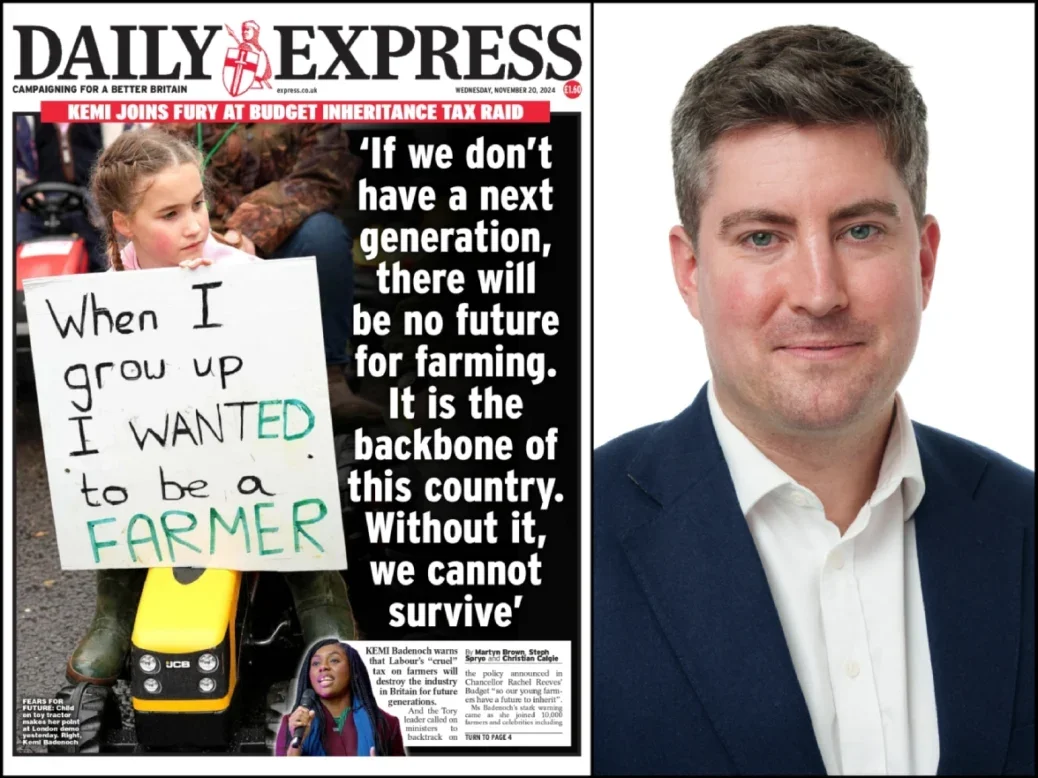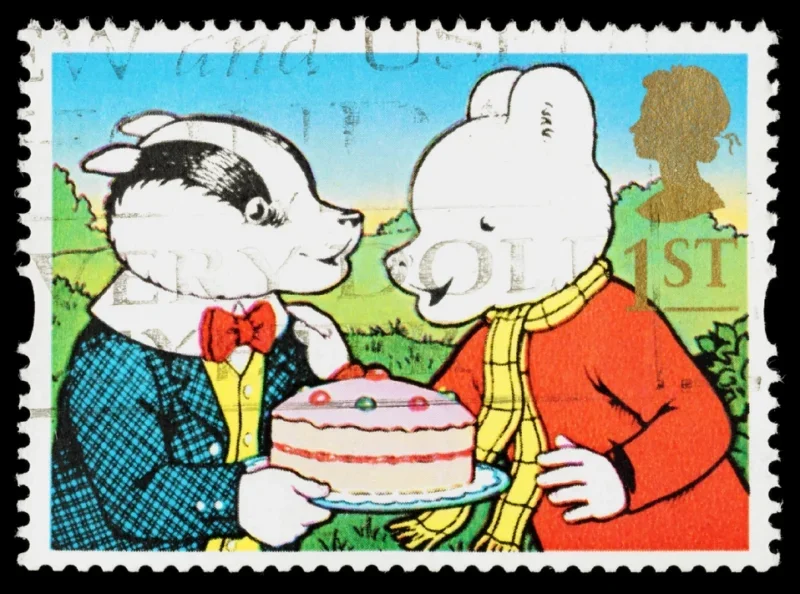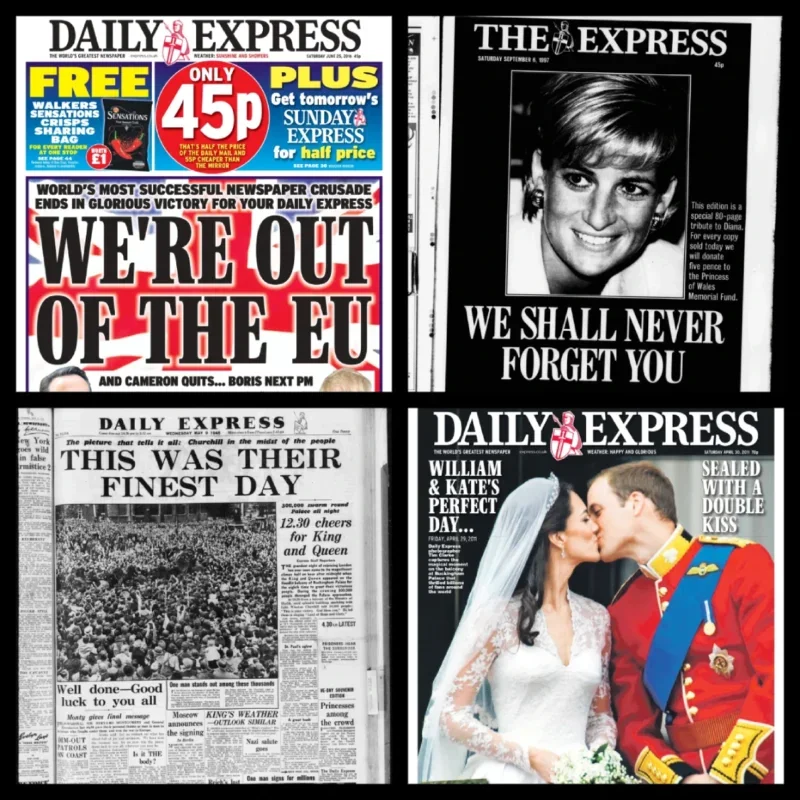
Becoming “best in class” for core topics like politics and defence is what will help the Daily Express survive and thrive into the next century, according to editor-in-chief Tom Hunt.
In his first interview since becoming editor in September, Hunt said imparting a culture of “proactiveness” within the newsroom of more than 100 people was also key.
It has been a time of reflection at the Express, which marked its 125th anniversary last week. Staff have been filling in a giant Express-themed crossword with historic front pages displayed in the office.
Hunt told Press Gazette: “We want it to be here for another 125 years, and it’s how we structure it in a way to still be recognisable and known.”
A key factor in that is making the most of the topics Express does best, which Hunt cited as politics, defence and royals.
He described politics as “our largest engagement driver with audiences: in terms of comments, we get almost 20,000 comments a day on the website from politics content alone.
“I see a large part of what we need to do over the rest of this year, and the next few years, is how do we take that loyal, engaged audience, and grow it further,” Hunt added, suggesting working with Reach’s new Studio video team.
He described gardening as a “unicorn subject” because the Express print audience loves it, it “works tremendously for us digitally” and “translates very well on Google Discover”. A gardening strategy is also being built with Studio.
Hunt also cited travel and said more could be done to make the most of the experience of journalists who travel for their reporting.
All of these topics are ones that have traditionally been in the Express in print anyway. “That’s kind of the key,” he said. “I don’t want it to be a completely standalone subject in the corner.”
The spirit of Rupert Bear
Hunt noted that the Express has had a series of newspaper firsts during its 125 years: it was the first to carry news on its front page rather than adverts, had the first gossip column, the first crossword puzzle, and the first horoscopes (initially in the Sunday Express).
Its famous Rupert Bear cartoon was created by Mary Tourtel, the wife of assistant editor Herbert Tourtel. Hunt suggested that “must have been an ‘oh, we need something now, what can we do with the team?’” in response to other papers having cartoons.
“I do think that kind of proactiveness, and let’s give this a go element is partly what I want to impart on the team…
“I think it also feeds into why it is such an exciting industry to be part of, because, yes, there is a way of telling a news story, but then the paper is a fantastic format for the light, the heavy, that mix of content, and you do need to break it up with things like cartoons and there’s modern ways in I think that we haven’t quite got to yet, but it’s exciting to try and get the team engaged with finding them and trialling.”
Since Hunt became editor he said he has been through three phases. The first was about coming up with “a structure and a system that will enable us to grow over the next few years”.
The major change has been the merging of the daily, Sunday and digital news teams, which were still being run separately, into one.
Describing it as a “multimedia loop”, Hunt said: “It’s my job to put the structure in place so that you write a really good story, it ends up online, in the paper, and hopefully with an element of video attached to it, and we create that circle without a reporter feeling like, oh, I’ve got to do this for print, and then I’ve got to do something completely different for online, and now I’ve got to go and do something completely different for video.”
Before taking over from Gary Jones in September, Hunt held eight roles at the Express in around eight years including online editorial director, head of news, video news editor and as part of the overnight team. He said this has enabled him to learn all the “pressure points” of the workflow and understand the difficulties facing each desk.
Hunt said the changes have already made a difference in print and online, reducing duplication and allowing reporters “a bit more time in the day, because they’re not trying to do six things”.
The second stage of Hunt’s tenure, he said, was to find out: “Can I step back slightly and it still work?” He said this is “the key with leadership… if you can remove yourself and it doesn’t break, that, to me, is a good example of getting the structure right and the team.”
A management team has been built around Hunt with four associate editors: former political editor Sam Lister who is taking the lead on new video ideas and former news editor Frances Millar joined Rob Virtue and Daisy Wyatt.
Daily Expresso Youtube launch
Lister, for example, is overseeing the upcoming launch of a Youtube-first, half-hour video strand called Daily Expresso which will be hosted by assistant editor JJ Anisiobi with some of the brand’s best-known columnists including Conservative MP Esther McVey and broadcaster Carole Malone.
Now, Hunt said, he is looking at how to promote the Express externally and build its brand identity. “Because I think there’s an enormous amount of brilliant journalism that we do day in, day out, that we probably don’t promote as well as other competitors in Fleet Street do.”
He cited the campaigns run by the Express in particular, with recent successes including the Give Us Our Last Rights crusade for assisted dying legislation to come to Parliamentary consideration, the fight for the Government to pay for veterans to travel to D-Day commemorations this year, and the long-running campaign to protect the state pension triple lock.

“That’s what we’re here for,” Hunt said. “Can we make a difference to our readers’ lives?… If we can then link that up across print, digital and video, I see that as going a long way to being successful.”
In March, the Express was the ninth biggest online newsbrand in the UK with an audience of 16.6 million, up 25% in a year (it was the 12th biggest newsbrand in March 2024).
Page views also increased, up 6% to 122 million across the month, although they were down compared to a recent peak of 149 million in July 2024. And total minutes spent with the Express were down 2.5% to 77.5 million.
Print circulation continues to fall by almost a fifth year on year, although print still makes up three-quarters of revenue for publisher Reach. The daily paper currently sells around 120,000 a day, with the Sunday edition on 106,000.
Hunt is not an editor that will forecast the death of the print paper within five to ten years, calling that type of statement unhelpful.
“I would argue if we get it right in terms of the content we are producing and the way we are promoting that content, then I see no reason the paper couldn’t survive way into the future.
“And I think if you turn around and say ‘there’s five years of this left’ equally what does that do for a team ethos where they sort of think, oh, I need to look at retirement… equally I might then stem that brilliant decision that is the next Rupert the Bear cartoon, but then does actually lead to an increase in print sales or the longevity of it.”

Hunt does not believe the print and digital Express reader are “overly different. A large part of what I see my job is, is if someone has only ever bought the paper and never looked at the website, how do I reach them and get them engaging with that content? Similarly if they’ve never bought the paper and they’ve only looked at the website…
“But the theme is, for me, is very much if we get the topics right – and I would be very keen on becoming best in class for certain topics, like defence and other areas – but if we can build that and be known for that, then I think when people arrive to read something they’re interested in on one of those areas, can we then entice them with something and keep them around for longer?”

The Express has enabled website users to pay for ad-free access for the past 18 months in a series of reader revenue experiments across Reach.
Paid premium website model for Express is on the table
Hunt suggested the Express could follow in the footsteps of the Manchester Evening News and Liverpool Echo apps to have a paid premium option, in this case with the e-paper, puzzles and other exclusive content: “It’s on the table in terms of looking at it, but we don’t have any hard and fast plans at the moment.”
Once the Express builds up its topic identities and certain personalities he said the growing paid-for newsletter model could also work but that this, again, is not an immediate strategy.
Ultimately in terms of revenue the important thing is to be flexible, Hunt said.
“If you’d have asked me three months ago about revenue, I would never have mentioned Facebook monetisation, and yet, we’re now getting paid by Facebook for engagement,” he said, citing the new Facebook content monetisation scheme.
“As with lots of the platforms, it’s great while it lasts and whether they keep that going, but it’s being open as a team,” Hunt said. “And a huge part of how I see my job with the Express is having the team and the structure ready to pivot when these opportunities are out.”
Hunt also referred to Tiktok recently adding the ability to include clickable links into stories for the first time.
“We are at an exciting point of lots of these channels are going to be trying lots of different things, and it’s where we need to have that very clear: this is what we want to be known for. This is what we’re going to be very good at. And where can we then find the best audience growth or opportunities on whichever channels it best fits?”
The ideal scenario, he said, would be having an equal reliance – of around a fifth – on different referral sources.
The Express has been a recent beneficiary of Facebook’s algorithm change to end its deprioritisation of hard news and politics. “For a while Facebook wouldn’t even really allow you to share royal stories,” Hunt said. Press Gazette analysis of Similarweb data in April showed Facebook grew as a referrer of social traffic to the Express by 26% in the past year while its total social referrals were up by 68%.
Looking ahead another 125 years, Hunt predicted “there’ll be 100 new formats that we probably haven’t even conceived yet. The key is… if we can be known for topics and being first to things in those areas and building that, I see that as a tremendous start for then expanding into all the other opportunities as and when they come, but that’s the starting point.
“Yes, ideally, 125 years, we’re still doing front pages in the paper and people are buying them and coming around,” he added, noting the question of whether standalone website homepages will exist anymore. A Reuters Institute report in 2023 found that less than a quarter of 18 to 24-year-olds were discovering news by going directly to news websites or apps.
“As an industry, I fear we are collectively too doom and gloom sometimes on these things,” Hunt said. “We need to instil that excitement in the teams and say, well, okay, that door’s closed, but there’s one opening over here, and we need to be ready to jump through it.”
Email pged@pressgazette.co.uk to point out mistakes, provide story tips or send in a letter for publication on our "Letters Page" blog
